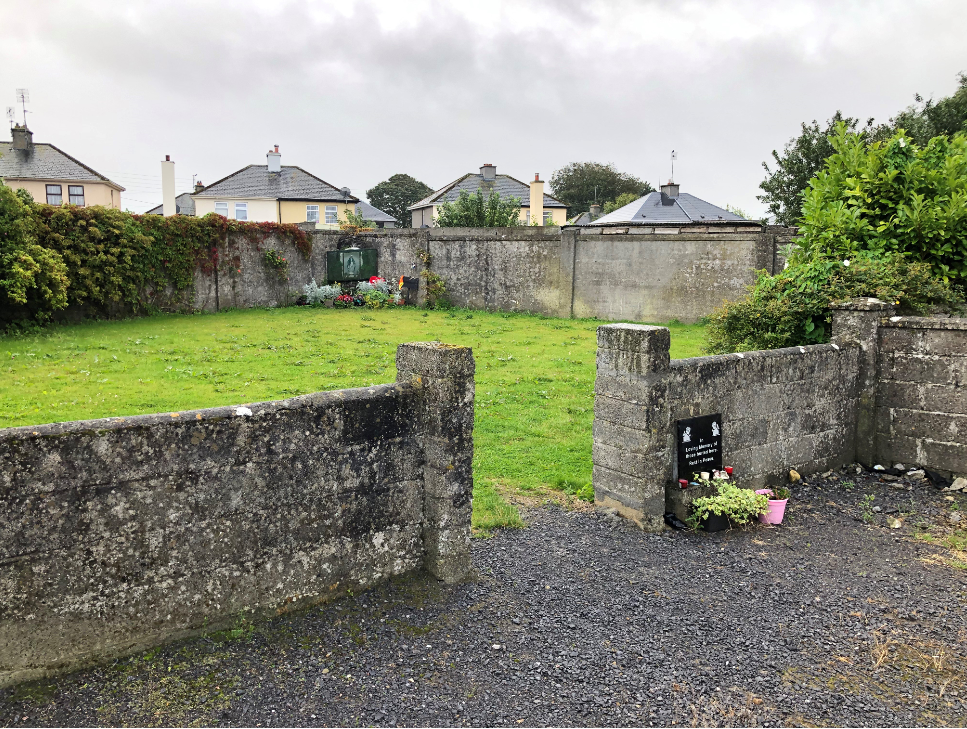Tiny bodies, the remains of little children entombed without name or mercy, are uncovered in Tuam, a small Irish town in Co. Galway in the west of Ireland, at the site of a former Bon Secours Mother and Baby Home in 2017. The excavation, part of a Mother’s and Baby’s Home commission of inquiry (set up in 2015), precipitated by the tireless research of a local historian Catherine Corless, uncovered an eerie underground structure demarcated into 20 chambers (possibly a sewage tank) containing the children’s remains. The commission stated that ‘multiple remains’ were found, but some estimates run as high as in the region of 800. The home was run by the Catholic Bon Secours order of nuns from 1925 to 1961, one of many on the island of Ireland at that time. Now in Oct 2020, even before the Commission of inquiry publishes their long-delayed report (original deadline Feb 2018 due now Oct 30th, 2020), the Irish State has stated it intends on sealing the Mother and Baby records for 30 years.
Stories of Industrial schools, Magdalene laundries and Mother and Baby Homes have abounded in the Irish mainstream since the mid 1990s. They point to the open wounds of an erstwhile Ireland dominated by an authoritarian Catholic Church, the public secrets of an egregious past which many continue to reckon with.
By 2014, when Catherine Corless’s research reached the mainstream media, the Irish public reacted with outrage. In spite of prior commissions of inquiry, newspaper reports, documentaries and public apologies, it was clear that the disquieting rhythms of our Catholic past, had not been fully attuned to. There were still more stories, still more truths to be told. We continue, so it seems, to inhabit what Caelainn Hogan (2019) in her wonderful book on Mother and Baby homes, calls a ‘Republic of Shame.’

Central to Hogan’s book is how complex it is for many survivors to piece together the traces of their story. Fragments, partial truths, bias and untruths persist in survivor’s searches to uncover the story of their own lives. This has been further compounded by a commission of inquiry conducted through a veil of secrecy, which, as the important Clann project (Justice for Magdalenes Research and Adoption Rights Alliance) insists has violated the European human rights law entitlements of survivors of the mother and baby homes. The commission of inquiry has attracted wide criticism, particularly from survivors and support organizations, regarding its denial of public hearings and refusal to allow survivors or their families to access the personal data which it holds.
Archives, as the shadow texts to our histories and stories, should be made as accessible as possible. As an anthropologist who has worked with Stolen Generations (Aboriginal Australians removed from their families and institutionalized or adopted under Australia’s assimilation policies) and an Irish person whose familial story is also entangled with the story of industrial schools, I have seen first-hand how vital access to archival material is to the restoration not just of story, but of self and family, ultimately, of how key it is to recovery, healing and reparation. I have also seen, how when access is denied, survivors and their families, often suffer a form of retraumatization.
Anthropologist Ann Stoler (2008) reminds us that archives are sites of acts of governance. Indeed, they contain what Derrida has called ‘archive trauma’ in their revealing of the dark intimacies of failed forms of governance, violence and suffering. Archives also tell lies, many of them, encounters and events reshaped through the lens of state power. These lies can be confronting to survivors but inheriting them in order to remake them into new personal and societal scripts is pivotal for individuals and societies needing to confront harmful pasts. This is about agency, voice, justice and reparation, it is about creating a place where conciliation with our past can finally begin in full.
The Irish State’s attempt to rush through a decision this week to seal the commission’s archive is a failure of ethico-moral and political responsibility to generations of survivors, living and deceased. Pleas against this blatant attempt to further shroud the history of mother and baby homes in even more secrecy are widespread. Instead of sealing records, what the Irish State should be doing is working towards the creation of a dedicated archive that tells the story of historical institutionalization and suffering through testimony and records, as the Clann Project has consistently called for. 100 years on from some of the defining moments in the creation of the Irish State what we need is a space which allows for a full reckoning with the failures of that very state, particularly towards women and children. To do anything less now in the bid to remember what the Irish State was, has become and aspires to be, would quite simply be a profound extension of erstwhile violence.
How can you help now?
Please sign this petition: https://my.uplift.ie/petitions/stop-the-30-year-seal-on-the-mother-and-baby-home-records?fbclid=IwAR16bdm50AEuPnPJxo7QftW5ZiPNBlZozu9T_AWKbTbsuHyrNtKYh1VW7uc
Please send an email from the following link
Fiona Murphy (Queen’s University Belfast) is a cultural anthropologist whose research focuses on Indigenous Australian politics and movements, refugee and mobility studies, and business anthropology. She has conducted research in Australia, Ireland, the United Kingdom, France, and Turkey, and has a particular interest in new forms of public anthropology. She is the co-author of Integration in Ireland: The Everyday Lives of African Migrants (2012) and has published in journals including American Anthropologist, the Australian Journal of Anthropology, and History and Anthropology.
Cite as: Murphy, Fiona. 2020. “Irish State to seal records of Mother and Baby Homes for 30 years: Urgent call for action.” FocaalBlog, 20 October. http://www.focaalblog.com/2020/10/20/fiona-murphy-irish-state-to-seal-records-of-mother-and-baby-homes-for-30-years-urgent-call-for-action/
Discover more from FocaalBlog
Subscribe to get the latest posts sent to your email.